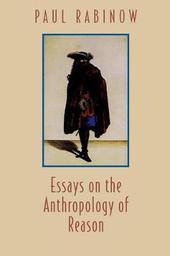
|
Essays on the Anthropology of Reason
Paperback / softback
Main Details
| Title |
Essays on the Anthropology of Reason
|
| Authors and Contributors |
By (author) Paul Rabinow
|
| Series | Princeton Studies in Culture/Power/History |
|---|
| Physical Properties |
| Format:Paperback / softback | | Pages:216 | | Dimensions(mm): Height 235,Width 152 |
|
| Category/Genre | Ethics and moral philosophy
Philosophy of science |
|---|
| ISBN/Barcode |
9780691011585
|
| Classifications | Dewey:301 |
|---|
| Audience | | Professional & Vocational | | Tertiary Education (US: College) | |
|---|
|
Publishing Details |
| Publisher |
Princeton University Press
|
| Imprint |
Princeton University Press
|
| Publication Date |
15 December 1996 |
| Publication Country |
United States
|
Description
This collection of essays explains the author's project to anthropologize the West. His goal is to exoticize the Western constitution of reality, emphasize those domains most taken for granted as universal, and show how their claims to truth are linked to particular social practices, hence becoming effective social forces. This text poses questions about how scientific practice can be understood in terms of ethics as well as in terms of power. The topics covered in the text include how French socialist urban planning in the 1930s engineered the transition from city planning to life planning; how the discursive and nondiscursive practices of the Human Genome Project and biotechnology have refigured life, labour and language; and how a debate over patenting cell lines and over the dignity of life required secular courts to invoke medieval notions of the sacred. The final essay is concerned with the place of science on modernity, on science as a vocation, and on the differences between the human and natural sciences.
Author Biography
Paul Rabinow is Professor of Anthropology at the University of California, Berkeley. Among his most recent books are Making PCR: A Story of Biotechnology and French Modern: Norms and Forms of the Social Environment, both published by the University of Chicago Press.
Reviews"Rabinow has produced a rich and elegantly written set of reflections for those who want to study a culture in the making, or are part of one. It is, of course, part of his argument that they include all of us."--Jon Turney, The Times Higher Education Supplement
|